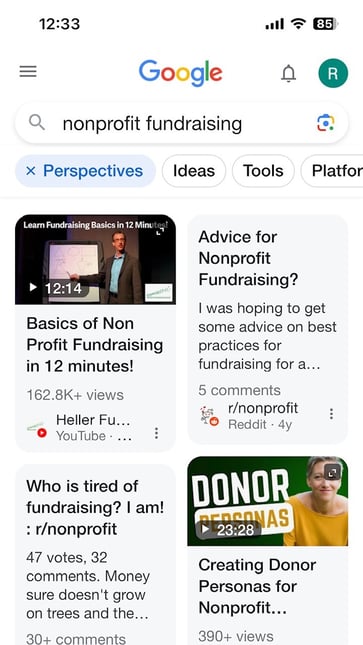Google has been all over the news in the last month, so we thought a nice roundup would be helpful to put the details all in one place and give a little insight into why nonprofit organizations should take note.
We’ll start with the biggest piece of information that shouldn’t actually be “new” to you.
Google officially retires Universal Analytics on July 1
Before you fire up the grill and sparklers this Fourth of July, Google will be making its own fireworks by formally sunsetting Universal Analytics (UA) on July 1.
This shouldn’t come as a surprise—Google has been practically shouting it from the rooftops for more than a year now. Hopefully, you’ve set up the migration to the new Google Analytics 4 (GA4). If not, you need to get started ASAP, and here’s a great guide for nonprofits.
For those who are just now turning their attention to using GA4, there are a few misconceptions that may need to be cleared up.
Much like UA, GA4 requires a bit of a learning curve to understand how to use it. UA was not “easy” or “idiot proof.” With UA, it didn’t take much effort to get high-level data like total visitors or pageviews, but digging deeper required more expertise. The same applies to GA4.
GA4 actually has more information available in its default settings than UA. For example, if you wanted to monitor scrolls, clicks or donation form interactions in UA, you had to set up custom tracking. All of that is available out of the box with GA4.
Also, it’s important to note that the arrival of GA4 does not mean the end of cookies. Google is planning to phase out third-party cookies over time—the end of 2024 by the latest measure—but first-party cookies are still very much alive. The world runs on first-party cookies, and that isn’t changing anytime soon. GA4 uses first-party cookies, just like UA did.
Don’t ignore GA4.
In today’s marketing world, the use of digital analytics is essential to revenue growth. Donors expect nonprofits to know them and understand them, and CRM data isn’t enough. If you want a true 360-degree view of your donors, you need to embrace the move to GA4.
Google is bringing changes to Search
AI is all over the news, and it can be exhausting to keep up with it. We can easily forgive you if you missed this announcement from Google about plans to supercharge Search with generative AI.
Google is calling this new feature Search Generative Experience (SGE), and it’s their answer to the partnership between Microsoft’s Bing and ChatGPT. Our SEO expert Mitchell Chokas wrote an excellent breakdown about how this will affect nonprofits.
But that’s not all. Google has also just recently launched a new Search filter called “Perspectives.” The explosion of influencers and content creators across social media is now being incorporated into organic search (see example below).

“Tap the filter, and you’ll exclusively see long- and short-form videos, images and written posts that people have shared on discussion boards, Q&A sites and social media platforms,” according to Google. “We’ll also show more details about the creators of this content, such as their name, profile photo or information about the popularity of their content.”
For now, this is just an optional filter. However, this could lead to content creators/influencers and their social accounts having more weight in search engine results, so if there's an opportunity for you to partner with an influencer, go for it!
European Union threatens to break up Google’s adtech business
This isn’t the first time Google has run into trouble in Europe, where digital privacy laws are more stringent than in the U.S. In fact, GA4 was developed partly as an answer to UA getting banned across Europe—and the jury is still out on whether GA4 meets their data privacy standards.
In the meantime, the European data privacy war continues in advertising. On June 14, EU regulators announced that Google may have to sell off a portion of its adtech business to continue operating in Europe. Regulators are accusing Google of “anti-competitive” practices and don’t see a path forward with any behavioral changes.
Ads make up 79% of Google’s revenue and accounted for $224.5 billion in 2022, so this is a big deal. It may be a while before the impact trickles down to the nonprofit industry, but as we’ve seen with GA4, what happens in Europe also has an effect across the Atlantic.
Stay tuned!






Leave a comment: